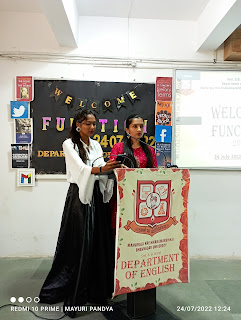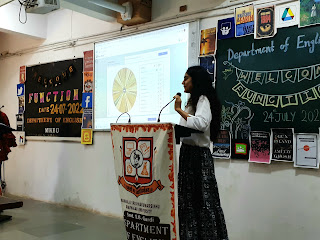Aristotle's poetics
Hello readers! My self Hetal Pathak. Here I am going to write down my first blog on Aristotle's poetics. In this particular blog, I am sharing my views on Aristotle's poetics, on the basis of my understanding.
Introduction
Before discussing about Aristotelian poetics. First, we need to understand the meaning of the word- 'poetics'.
- " The art of writing poetry. "
- " Poetics is the theory of literary forms and literary discourse."
- Poetic means, something like or related to a poem, or with qualities found in poetry."
About Aristotle
Aristotle ( 384 B. C. to 322 B. C.) was one of the greatest philosophers who ever lived and the first genuine scientist in history. He made pioneering contributions to all the fields of philosophy and science. Aristotle was a student of plato for twenty years. but is famous for rejecting palto's theory of forms.
What is Aristotle's poetics :-
" The poetics of Aristotle" is a much disdained ( a feeling of contempt for someone or something regarded as unworthy or inferior). book written by Aristotle. The book was composed around 335 B. C.
- Aristotle's poetics is the earliest surviving work of Greek dramatic theory. In poetics, Aristotle discusses poetry - both in general and in particular.
- He also considers the effects of poetry on those who consume it and the proper way in which to construct a 'poetic plot' for maximum effect.
Plato's main objections against poets and poetry :
Plato's charges / objections against poets and poetry. But, we should know that what these charges are. They are given as below.
- Plato disapproves poetry because it is Immoral.
- Plato thinks that poets creates poetry in a state of frenzy. ( frenzy means - " A state period of uncontrolled excitement or wild behaviour)."
- Plato objected poetry from the point of view of Education.
Reasons for Plato's Disagreement :
- Plato disapproves poetry because it is immoral. He says that it is based on falsehood. As a philosopher, Plato thinks that philosophy is better than poetry. because philosopher deals with idea/ truth. Whereas poet deals with what appears to him / illusion.
- Plato thinks that when a poet creates poetry with a frenzy state of mind it leads to such a harmful depiction. Which is not a good thing.
- Plato objected poetry from the Educational point of view, by saying that it cultivates evil habits and not practical.

What Plato thinks about poets:
According to Plato, poets are
- Immoral
- Liars
- Imitators
- Liars
- Poets are Immoral because they further immoral depiction and representations. Which is not good. - according to Plato 's thinking.
- According to Plato, poets are liars because of two primary reasons.
- Gods are representative in a very false manner.
- The ultimate real world is an unchanging world.
- Plato thinks that human Agencies have no control on that ultimate agencies. and poets are exactly doing the same thing.
- Poets bring changes in their unchanging world through their depiction.
Aristotle's defense of poetry:
Aristotle replied to the charges made by his guru Plato. He replied to them one by one in his defense of poetry.
Theory of Imitation :
Aristotle agrees with plato in calling the poet - " an Imitator ". and creative Art, Imitation. Aristotle believes that there is natural pleasure in imitation which is in- born instinct in men.
All arts are imitation but they are differ from each other in 3 ways.
- Medium of Imitation.
- Object of Imitation.
- Mode of Imitation.
Medium of Imitation :
All arts present human action through rhythm, language and melody. But, they employ different mediums.
Ex : Music - Rhythm, Drawing - colour.
Object of Imitation :
All art forms present men in action but with different objects. Ex : some poem represent men of good manner and in some bad.
Mode of Imitation :
All art differ in their mode of Imitation. Ex: In some poems poet himself narrates and in some the character in poem.
Here, I am giving answers on below questions on the basis of my knowledge & understanding.
Question : 1 With the reference to your literary texts you have studied during B. A programme , write a brief note
on the texts which followed Aristotelian tradition?
Answer : I have studied " All my sons " by Arthur Miller during my Bachelor's degree. As we all know that All my sons - tragic play. First we will elaborate " All my sons" by Arthur Miller.
In the play All my sons by Arthur Miller we can say that it follows Aristotelian tradition in one way or the other way. In that play there are many characters but one of the chief character was " Joe Keller." Now we will discuss that how it follows Aristotelian tradition.
Conflict is the main theme or we can say central theme in the play - All my sons.
According to Aristotle, - A tragic character is one who is not pre- eminently good and just but is highly renowned and prosperous and suffers from - " Hamartia".
Hamartia : " A fatal flaw leading to the downfall of a tragic hero or heroine. "
There is supposed to be an action that reveals the protagonist's hamartia. In the play All my sons we can relate with all this things. So, we can say that somehow it follows Aristotelian tradition.
Question : 2 Have you studied any tragedies during B. A programme? Who was / were the tragic protagonists in those tragedies? What was their hamartia.
Answer : I have studied some tragedies when I was in my Bachelors. I will give little reference about those tragedies.
Tragedies : All my sons, Hamlet & Othello.
Tragic hero / protagonists :
All my sons - Joe keller
Hamlet - hamlet
Othello - othello
Hamartia :
All my sons - shipping of faulty parts.
Hamlet - feeling depressed by his mother's remarriage and angry at his uncle.
Othello - Internal tragic flaw, is his extreme jealousy.
Question 3 : Did the plot of those tragedies follow necessary rules and regulations proposed by Aristotle?
Answer : The plot is the underlying principle of tragedy. By plot Aristotle means- " The Arrangements of incidents."
Incidents mean action, and tragedy is an imitation of actions, both internal and external.
Aristotle considered the " Plot to be the soul of a tragedy, with character in second place."
As far as these tragedies are concerns we can say that in one way or the other way it follows necessary rules and regulations which are proposed by Aristotle. But, the main point is that plot is very much important.
I hope that this blog is Useful to You...
Thank You so much for Visiting...
[ Words :- 1048 ]


















